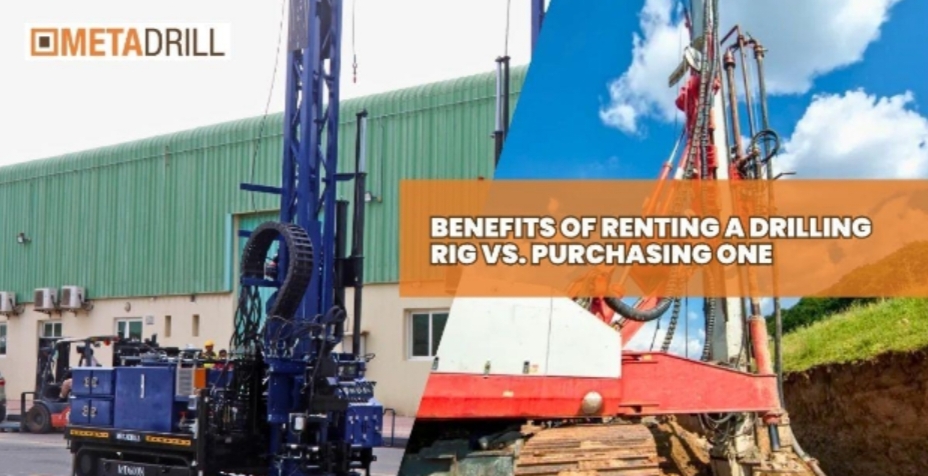Is it prudent for contractors to lease or purchase a geotechnical drilling rig? The decision to lease or purchase drilling equipment will matter. It defines efficiency, cost, and success. Leasing is flexible and requires little maintenance.
Purchasing is economical in the long run and allows equipment ownership. Contractors must know the advantages and disadvantages of leasing and purchasing so that they can make the right decisions for their projects and budgets.
Renting vs Buying Drilling Rig: Financial Analysis
Hiring or purchasing drilling rig tools and equipment involves cost consideration. These are the initial cost, cost over the long run, and return on investment.
Initial Investment and Cash Flow Implications
Renting a drilling rig limits initial expenses to contractors, enabling them to invest in other areas of a project. This gives a good cash flow, which is required for most firms. Initial Investment Comparison: Buying rigs is an expensive investment, a drain on funds. Renting circumvents this huge cost.
Long-term Cost Comparison
Leasing will be cheaper short-term, but buying is cheaper long-term. It costs more to rent something for a long time than it does to buy it. Contractors have to consider how much they will use something and how long their projects last.
Return on Investment Calculations
Contractors have to determine ROI on leasing compared to purchasing. ROI is the ratio of profit on investment to investment cost. In the case of drilling rigs, it is profit over the cost of purchase or lease.
ROI Factors: Purchase of rigs affects ROI in terms of usage, maintenance, and depreciation. ROI for leasing is calculated based on rental fees and project revenue.
Operational Flexibility and Project Adaptability
Renting drilling rigs makes it easy to change plans as needed. This is very important in the drilling world. Projects can change a lot.
Contractors can hire the proper equipment to do each job, be it exploratory drilling or soil testing. The key to quality work and client satisfaction is flexibility.
Matching Equipment to Varying Project Requirements
Every project is different and needs its own tools. Renting lets contractors choose the best equipment for each job. This way, they can face any challenge head-on.
• Exploratory Drilling: Renting special rigs for exploratory work helps get accurate data fast.
• Soil Testing: Renting different soil testing tools lets for detailed soil analysis. This is vital for building foundations and planning.
Scaling Operations with Rental Equipment
Renting equipment also means you can grow or shrink your operations easily. Contractors can adjust their size to fit project needs without being stuck with certain tools.
1. For small jobs, renting smaller rigs is smart and saves money.
2. For big projects, renting more or bigger rigs lets you meet the demand.
This flexibility and adaptability make leasing the best choice for contractors since they continue to enhance their skills.
Maintenance Responsibilities and Equipment Reliability
Maintenance reliability of the drilling rig is of the highest priority. Maintenance responsibility is established by renting or purchasing. Maintenance of equipment is vital in geotechnical drilling and influences quality and finish.
Ownership Maintenance Costs and Challenges
The owners of the drilling rigs bear the maintenance costs and problems. They must deal with repairs, maintenance, and part replacement. This is time-consuming and expensive. Maintenance costs can be a significant proportion of the cost of operating a project.
These unexpected breakdowns can lead to delays and additional expenses. It is a significant concern for owners.
• Routine maintenance involves oiling equipment, inspecting drill bits, and inspecting hydraulic systems.
• Contractors must also train employees to execute these activities.
• The cost of keeping a drilling rig running can change based on how much it’s used. Projects that need more work require more upkeep.
Rental Service Agreements and Technical Support
Renting drilling equipment means the rental company handles maintenance. Rental deals usually include full maintenance and technical help. This makes sure the equipment works well all the time.
Some main benefits of renting include:
1. Getting the newest equipment with little downtime.
2. Help from skilled technical support staff.
3. Regular maintenance and upkeep by the rental company.
Choosing to rent lets contractors focus on their main work. This can save money and make projects run smoother.
Technology Access and Equipment Obsolescence
The drilling industry changes fast. Contractors need a smart plan for managing their equipment. They must keep up with new tech to stay ahead.
Renting drilling rig equipment helps contractors get the latest tech without big costs. This way, they can quickly meet project needs and tech changes.
Keeping Pace with Drilling Rig Technology Advancements
The drilling world is seeing big tech leaps. New tools and equipment make work better, cheaper, and safer.
Key advancements include:
• Enhanced automation features
• Advanced data analytics for real-time monitoring
• Improved drilling precision and accuracy
Leasing enables contractors to take advantage of such new technology without the burden of purchase. This keeps them competitive in a rapidly evolving market.
Upgrading Challenges for Owned Drilling Rig Equipment
For those who own drilling rigs, keeping up with tech can be tough. Upgrading to the latest tech is expensive and not always easy.
The challenges include:
• High upgrade costs
• Potential downtime during upgrades
• The risk of equipment obsolescence
Renting is a good option. It lets contractors use the newest tech without the upgrade problems.
Specialized Applications and Equipment Requirements
Specialized machinery is required in drilling activities. They involve geotechnical surveys and exploratory drilling. The diverse geology of the soil requires rigs to be very flexible, from well logging to soil testing.
Exploratory Drilling and Soil Testing Equipment
Exploratory drilling digs into the earth to learn about what’s below. Specialized drilling rigs use tools like drill bits and samplers for this.
Soil testing tools are key for understanding soil and rock. They include:
• Sampling drills
• Core barrels
• Split-spoon samplers
Well Logging and Geotechnical Investigation Tools
Well logging records data on geological formations. Geotechnical investigation tools help analyze these formations.
Tool
Purpose
Gamma-ray logs
Measure natural gamma radiation
Resistivity logs
Measure the resistivity of formations
Acoustic logs
Measure the acoustic properties of formations
Specialized Drilling Rig Tools for Different Soil Conditions
Soil varies greatly. This means specialized drilling rig tools are needed. For hard rock, durable drill bits are essential. For softer soils, sampling and coring tools are better.
Conclusion: Making the Optimal Decision for Your Drilling Operations
The choice to lease or buy a drilling rig is based on several factors. Your project needs, your budget, and how you work are examples of such factors. The pros and cons of leasing or buying a drilling rig should be considered when deciding between the two.
In the very dynamic drilling business, firms need to make the right decisions if they want to remain operational. Leasing will provide you with economic advantage and flexibility. But purchasing will allow you to keep your equipment for a longer period. The best option is to go through your project requirements and your budget thoroughly.



